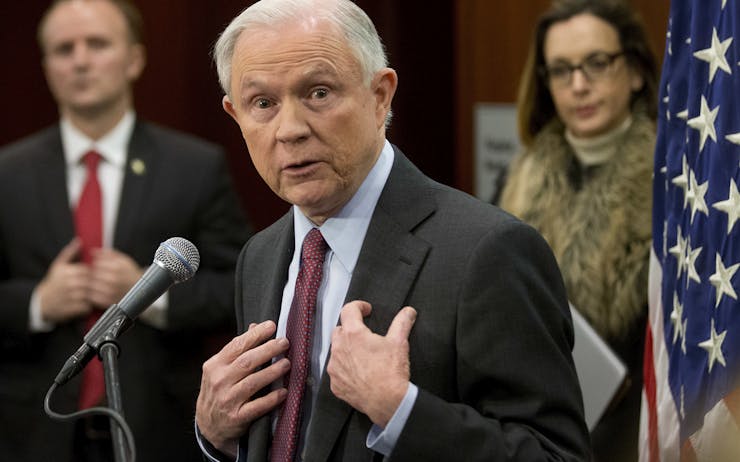Jeff Sessions might hate cannabis, but he sure seems to like talking about it.
“Our nation needs to say clearly once again that using drugs is bad, that it will destroy your life.”
At three separate events on Wednesday, the US attorney general almost gleefully attacked cannabis—demeaning research that shows its potential to reduce opioid deaths, casting doubt on the drug’s medical benefits, and encouraging a return to the drug war’s dogmatic “Just say no!” mantra. At the same time, Sessions acknowledged the validity of the Cole memo, which allows states to proceed with adult-use cannabis regulation, and recognized that the Department of Justice doesn’t have the resources to initiate nationwide cannabis raids.
“We’re not able to go into a state and pick up the work that the police and sheriffs have been doing for decades,” he said at a press conference Wednesday:
The Cole memorandum set up some policies under President Obama’s Department of Justice about how cases should be selected in those states and what would be appropriate for federal prosecution, much of which I think is valid. I may have some different ideas myself in addition to that, but essentially we’re not able to go into a state and pick up the work that the police and sheriffs have been doing for decades.
But at the same event, he opined that “medical marijuana has been hyped.”
I think medical marijuana has been hyped, maybe too much. It’s possible that some dosages can be constructed in a way that might be beneficial … but if you ever just smoke marijuana for example where you have no idea how much THC you’re getting it’s probably not a good way to administer a medicinal amount.
Sessions also reiterated his personal zero-tolerance position. “Our nation needs to say clearly once again that using drugs is bad,” he told a law enforcement audience, “that it will destroy your life.”
“We need to say, as Nancy Reagan said, 'Just say no! Don’t do it!'”
At a second event, speaking to law enforcement, Sessions was expected to claim that cannabis is “only slightly less awful” than heroin. He cut that claim—heroin has killed tens of thousands of Americans in recent years; cannabis overdoses have killed zero—but instead name-dropped Nancy Reagan, seeming to advocate a return to the war on drugs:
“I think we have too much of a tolerance for drug use—psychologically, politically, morally,” he said. “We need to say, as Nancy Reagan said, ‘Just say no! Don’t do it!’ There’s no excuse for this, it’s not recreational. It can be destructive and it consistently is destructive.”
One of his most controversial claims at that event was that cannabis as a means to reduce opioid use is a farce:
I’m astonished to hear people suggest we can solve our heroin crisis—have you heard this?—by having more marijuana. I mean, how stupid is that! Give me a break! So we’re going to have to stand up and confront that, tell the truth here. And our nation needs to say clearly once again that using drugs is bad, that it will destroy your life.
If Sessions is really interested in the truth, he should pay attention to the growing scientific evidence that suggests he’s flat-out wrong. (Read my colleague Bailey Rahn’s in-depth piece on the issue here.)
Sessions professed a desire to save lives, but he appears deaf to the growing calls for evidence-based approaches. Instead he fell back on the ideology that a drug is a drug—and that all drugs are bad:
Lives are at stake and we’re not going to worry about being fashionable in my view at this point in time. We’re going to see and we’re already seeing the death and destruction that results from the prevalence of drugs in America and the argument’s not going to be too hard to win in the months to come—people will see too many of the people they know losing their lives.
It’s not yet clear how Sessions’ views on cannabis will affect Department of Justice policy. In fact, Sessions himself may not yet have decided. Later on Wednesday, speaking to radio host Laura Ingraham—whose show’s tagline is “Your healthy radio addiction”—he laid out a fuzzy “fair plan” for cannabis enforcement, one that apparently has yet to be developed:
Federal law remains in effect and it makes it unlawful to distribute or possess marijuana in any state even though the state might legalize it. So within those states we’re going to develop plans that have a good, sound basis to it and we’re not going to stop prosecuting marijuana in those states. We just don’t have the personnel to walk the streets like the local police… It still remains against federal law to possess and distribute marijuana and we’re going to develop a fair plan for that.





